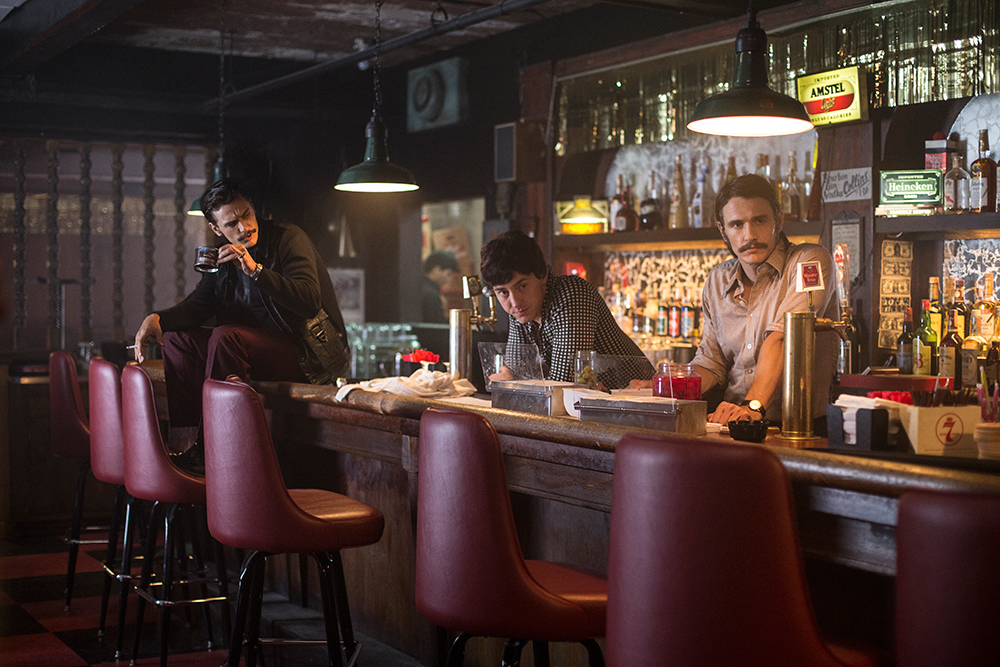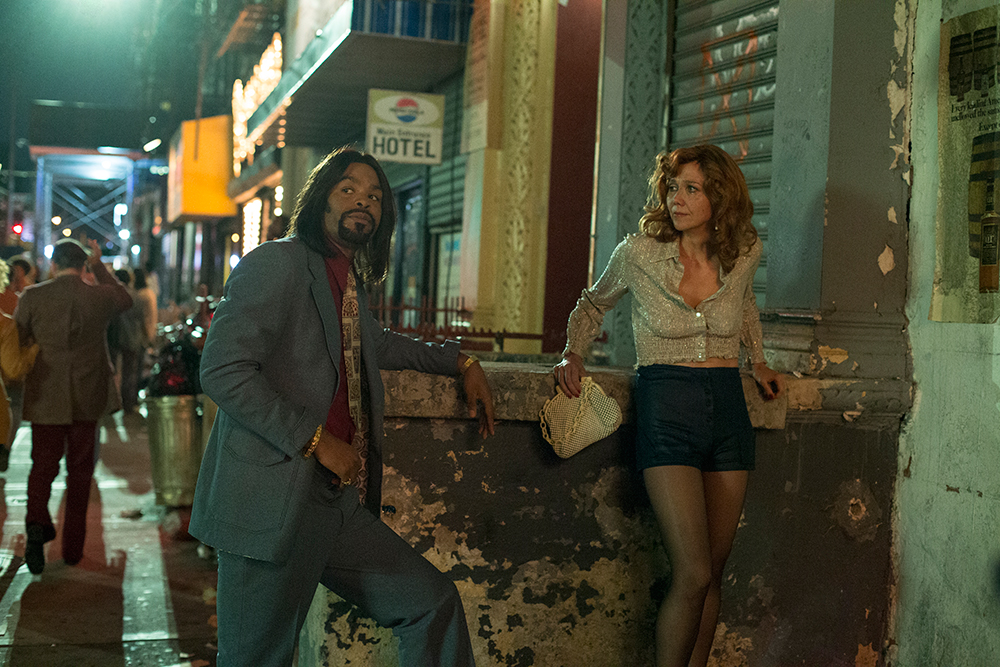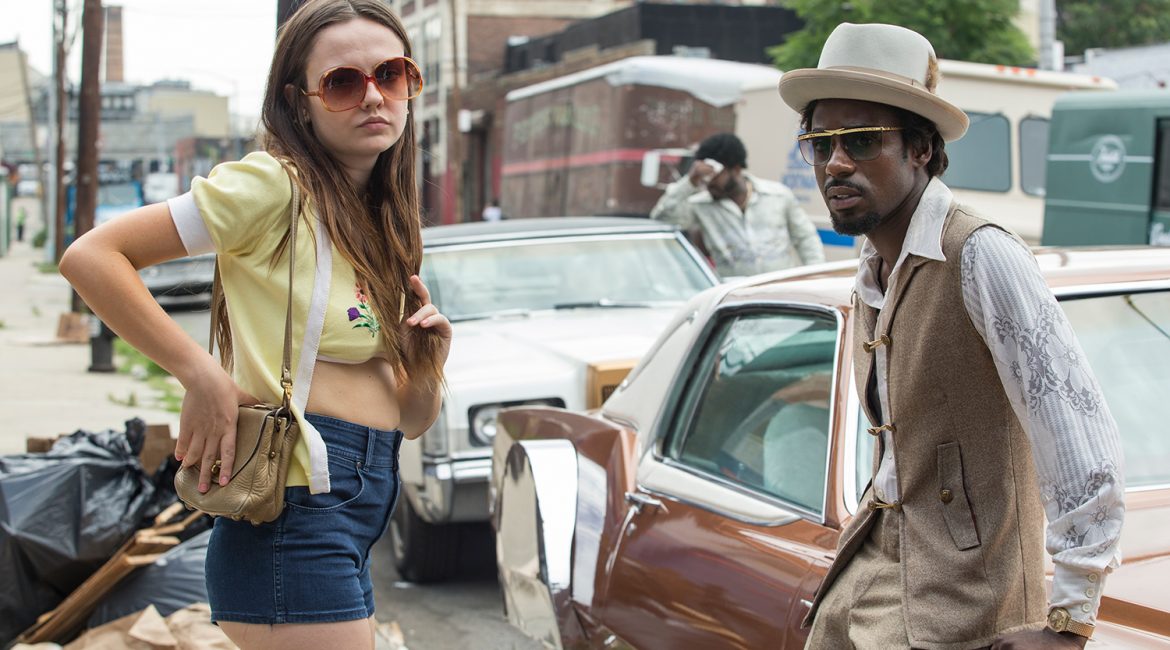Sex is transactional, and female bodies are the commodities. This is the thematic underpinning of The Deuce, HBO’s new 1970s porn-era period piece from co-creators David Simon and George Pelecanos. The series marks Simon and Pelecanos’ third collaboration, for the duo previously worked on HBO’s Treme and, most notably, The Wire, another HBO drama created by Simon — with Pelecanos having co-written and produced the series — and one that earns its place in the pantheon of modern television classics. Both shows were set in a specific time and place in American culture, and like those series, The Deuce captures and critiques a particular slice of American society with a gritty and immersive realism — one that is humanely rendered and brought to life by a sprawling and talented ensemble cast. Whereas Treme shed light on the struggles of a New Orleans community in the wake of Hurricane Katrina, and The Wire pulled back the ineffectual and destructive layers of Baltimore’s War on Drugs to reveal a complicated web of institutional malfeasance and bureaucratic complicity, The Deuce looks at capitalism through the lens of the burgeoning porn industry in the 1970s and through its glory days in the early 80s. What results is yet another artistic achievement that doubles as a morality tale of the decay of a modern American city; demonstrating once again Simon and Co.’s commitment to probing the power dynamics, moral rot and systemic corruption of civic institutions — except here, the institution in question is the sex industry. Through its superb writing, impeccable period detail, and dialogue steeped in verisimilitude, The Deuce plunges us into the network of economic, political, racial and power hierarchies and tensions that existed in New York City before the days of gentrification. The show provides an intimate portrait of characters living in the margins of society, each one inhabiting a different role within their overlooked and seedy social milieu.
The Deuce looks at capitalism through the lens of the burgeoning porn industry in the 1970s and through its glory days in the early 80s.
The series opens in 1971 Times Square, a time when the stretch of 42nd street between sixth and eighth avenues — the ‘deuce’ as it was called — was home not to costumed Spidermen and souvenirs, but to strutting pimps, cheeky hookers, live peep shows, scuzzy hotels that charged by the hour, and pay phones that doubled as oral sex chambers. In this mecca of sleaze and smut, commercialized sex was the name of the game, and among its litany of players were cops, johns, street hustlers, Mafiosi, grindhouse filmmakers, reporters, students, and working class folks just trying to make ends meet. The first character to be introduced is Vincent Martino (James Franco), a hard working and hustling bar manager who works two jobs seven days a week just to make enough to support his unfaithful wife and kids. There’s an earnest, gruff charm to Vincent’s determined blue-collar work ethic, one that endears viewers to him despite his own questionable behavior. Contrast that with Vincent’s twin brother Frankie (also played by Franco), a flighty and irresponsible serial gambler who is always racking up debts that will eventually fall on his brother’s shoulders. Although both brothers sport the same mustache and are nearly indistinguishable, Franco imbues each with their own subtle yet distinctive gesticulations that never veers into gimmickry. It is likely that audiences will raise their eyebrows when seeing the brothers together for the first time in the same frame, but it should be known that these characters are based on real-life twin brothers who became front men for mobster-run “massage parlors” during this time.

Frankie Martino (Far Left / James Franco) and Vincent Martino (Far Right / James Franco) | Photo courtesy of HBO
Although Vincent is our main point of entry into the series, he is in no way the star. In fact, rather than orbit the show around a singular character, it instead sheds light on a kaleidoscope of individuals from every corner of this social microcosm, each with their own backgrounds and motivations. Every character is a patch in this fringe social tapestry, and the star of their own life story. That brings us to Candy, who is perhaps the second most prominent character on the show. As played by Maggie Gyllenhaal, Candy (whose birth name is Eileen Merrell) is a weary yet resolute prostitute who, despite being soft-spoken, maintains her self-sufficient professionalism and insists on working independently, much to the admiration of her fellow working girls, and to the chagrin of the deuce’s pimps. Gyllenhaal brings an understated nuance to Candy that suggests a deeply layered soul in conflict; she is an enigmatic character whose facial expressions always seem to betray her misery and humiliation. Eileen is desperate to change her life, yet her financial responsibilities as a mother tether her to the streets.
Indeed, in the world of The Deuce, everything boils down to the flow of money, and human bodies are the merchandise. Candy knows this perhaps more than any other female character; her words and body language communicate the purely transactional, albeit dangerous, nature of sex work; and the banality of her job — the daily grind, business calculations and price negotiations — bristles against the violence, fear, and danger she faces on a regular basis. She wants others to understand that this is her job — her bread and butter — and as such there is no room for sentimentality or compromise. This makes Candy’s eventual foray into adult films all the more compelling, for she is able to recognize what she sees as the territory where female objectification and empowerment intersect, believing that once she finds a way to get behind the camera, she will be able to exert a greater degree of agency over her body’s role in satisfying the male gaze, while also capitalizing on the financial power her sexuality yields.
And though Candy’s full narrative arc this season remains to be seen, what is certain is that her story and character embody the show’s interest in the relationship between violence, money, power, fear, morality and eroticism — themes that are integral to the show’s look, feel, atmosphere and approach to sex. Like Candy’s experience with porn, the show opts to eschew the male gaze whenever possible and assume a female POV; adopting a straightforward and frank look at sex work, and approaching its sex scenes with a casual and unfussy matter-of-factness. It succeeds, then, in illuminating the sexploitation of the time, without itself being exploitive. The same goes for its nudity; though there is a generous amount of it, it’s equal opportunity and never feels gratuitous or titillating, but rather purposeful. And though two men helm the series, there was strong female input throughout every aspect of the creative process, with Gyllenhaal signing on as producer and four episodes having been directed by women — including the pilot and the finale, which bears the sensibilities of TV auteur Michelle McLaren (Breaking Bad, Game of Thrones, Better Call Saul). As Gyllenhaal noted during an interview, she hopes the show induces a sense of dissociation for the viewer; where they become turned on, but are then forced to question what exactly is turning them on.

Rodney (Method Man) and Candy (Maggie Gyllenhaal) | Photo courtesy of HBO
The Deuce also exhibits this deft tonal navigation in its examination of the harsh realities of each characters’ lives; never veering into utterly bleak and removed journalistic territory, romanticized nostalgia or finger-wagging judgment. At the same time, Simon and Pelecanos do not shy away from poking into every janky nook and cranny of this social ecosystem on a macro and micro scale; illuminating its vast landscape through intimate stories of those involved, and rendering each character with empathy and dignified humanity along the way. It’s almost unfair to call the series a period piece, because that suggests a level of artifice that isn’t present. In the show’s refusal to sugarcoat the past or play into the glamorized disco-fever often associated with the 70s sexual revolution, the show faithfully captures the grime, grit and grunge of 70s Times Square through aesthetic choices that feel fully inhabited and completely unobtrusive. Its production design never feels glossy or showy, and every detail and artistic choice feels grounded in the series’ air of melancholy, which is in line with Simon’s brand of humanist social realism. There’s an immersive harmony to the show’s visual palette that feels like a natural, wholly lived in and unassumingly vibrant. One can almost smell the cheap cologne and cigarette smoke wafting through the crowded diners and bars, sense the filth and litter strewn about pedestrians’ feet, and feel the layer of sweat and bodily fluid on each hotel comforter.
These ambient details also contribute to the viewers’ sensory and emotional dissociation, for just when you find yourself aroused by an image, a spot of mold that catches your eye, a cringe-inducing shot of a working girl walking barefoot on the sidewalk, or the furious look in a pimp’s eyes, will snap you back to these characters’ stark means of survival in a system that barely acknowledges them.
In its emphasis on grit over glamour and artistic purpose over prurience, The Deuce takes an un-sanitized look at a fascinating time in American history when obscenity laws were being rewritten, and porn’s shift from underground subculture to the mainstream was skyrocketed by the release of Linda Lovelace’s now iconic Deep Throat. The show’s dissection of money, power, misogyny, emerging feminism, and raw sexuality — of the maneuverings of the players, pimps and prostitutes enmeshed in this social apparatus — are explored with grace, honesty, and a keen awareness of human resilience.
In just one episode, Simon and Pelecanos add shades of dimension to their world with an array of colorful characters whose stories often intertwine. The show masters the camaraderie, volatile charm and glib dialogue of the handful of pimps we come to know closely (Method Man plays a pimp named Rodney who’s eager to recruit Candy, while the standout goes to Gary Carr’s sublime portrayal of the charismatic, sinewy and ruthless CC), and understands the economic desperation that drives many of these women into the industry.
Knowing that this decade will be followed by the excessive materialism, AIDS panic, and social conservatism of the 80s gives the series a slight air of tragedy, but one that doesn’t undermine the emotional stakes for each character. If the pilot is any indication, The Deuce promises to be inquisitive, illuminating, and captivating — so for now, there’s no reason not to join these hustlers and misfits on their carnal and hedonistic journey to make the best out of the hand they’ve been dealt. Little did these working girls know that in donning those platforms and layering on the lipstick, they were joining a movement that marked a paradigm shift in our country’s social, economic, and cultural relationship with sex.
For more information visit hbo.com

